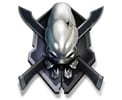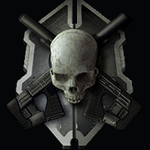Legendary: Difference between revisions
From Halopedia, the Halo wiki
m (Corrected spelling mistakes) |
|||
| Line 145: | Line 145: | ||
[[File:TLJ Legendary Difficulty (Reach).png|thumb|right|The ''Halo: Reach'' version.]] | [[File:TLJ Legendary Difficulty (Reach).png|thumb|right|The ''Halo: Reach'' version.]] | ||
===General differences=== | ===General differences=== | ||
*In ''Halo Reach'' enemy AI will be scaled according to the number of players (i.e. the more players there are, the more intelligent the enemy AI is) | *In ''Halo Reach'' enemy AI and amount will be scaled according to the number of players (i.e. the more players there are, the more enemies there are and the intelligent the enemy AI is); therefore it will not necessarily be easier to complete a mission on Legendary with more players. | ||
*Shade turrets fire | *Plasma projectiles travel faster than other difficulties. Shade turrets can fire faster than physically possible by the player. | ||
*[[Sangheili General|Elite Generals]] appear more often, usually wielding Covenant heavy weapons. | *[[Sangheili General|Elite Generals]] appear more often, usually wielding Covenant heavy weapons. | ||
Revision as of 02:10, August 23, 2015
- "You face opponents who have never known defeat, who laugh in alien tongues at your efforts to survive. This is suicide."
- — Description from Halo: Combat Evolved, Halo 2 and Halo: Combat Evolved Anniversary.
- "Tremble as teeming hordes of invincible alien monsters punish the slightest error with instant death... again and again."
- — Description from Halo 3, Halo 3: ODST, Halo: Reach, and Halo 4.[note 1]
Legendary is the highest and most difficult setting of Campaign gameplay in every Halo games to date, aside from the informal "Mythic" difficulty which is Legendary with all Skulls active in Halo games that feature them. Legendary difficulty is also featured in Firefight, Skirmish and Spartan Ops games.
Summary
In the original Halo trilogy, the difficulty is symbolized by an Elite skull with a bullet-hole through one side, two crossed combat knives and a shield bearing the Marathon symbol, though it is hidden behind the skull. In Halo 3: ODST it is symbolized by a human skull with two crossed Suppressed SMGs and the same shield with the Marathon symbol slightly visible behind the skull. In Halo: Reach and Halo: Combat Evolved Anniversary, it returns to the original trilogy's representation, but these games along with future titles lack the Marathon symbol. In Halo 4, the shield and the combat knives have been redesigned while the skull of a Promethean Knight replaces the previous skulls.
It is regarded as a large challenge even for veteran players. Allies are practically useless aside from creating distractions. Overwhelming enemy firepower and superior numbers are plentiful on Legendary, and AI enemies have greater intelligence. The player must play cautiously and conservatively to succeed. Enemies are extremely strong while the player and his/her allies' strength is extremely low in comparison, often leading the player to die frequently. Legendary on Halo 2 in particular is widely regarded as nearly impossible, due to certain levels being extremely difficult. Finishing the Campaign on Legendary difficulty unlocks an additional scene in the ending cutscenes of all Halo games except Halo 2 and Halo: Reach. Other cutscenes can also have minor differences, such as different dialogues or animations, while playing on Legendary, in Halo: Combat Evolved, Halo 3, Halo 3: ODST and Halo: Reach. Several achievements, challenges, commendations and career awards reward players for accomplishing various tasks on Legendary difficulty.
Halo: Combat Evolved and Halo: Anniversary
In the first Halo game, the differences between Legendary and other settings is relatively numeric. The player does not face unique or different enemies yet they face many more enemies who are tougher to defeat and endure. Many of the same strategies that work on other settings work on Legendary in this game except that the player has to be extremely careful of his/her own weaknesses. This is where the Noob combo comes in handy, with use of the Plasma Pistol and M6D Magnum.
General differences
- Player shields are half their Normal resistance. A few hits from plasma will often drain them completely.
- Enemy shield resistance is doubled.
- Extremely weak health. One melee from an enemy in front of the player will often prove fatal.
- Player shields and enemy shields recharge faster - twice as fast as when on Normal difficulty.
- Enemy health is doubled.
- Elites: Twice as many Elites appear as on the Normal difficulty. Elite Majors are encountered at a ratio of about one of every three Elites encountered, improving enemy forces. An area that had two Elite Minors on Normal should have four to five Elites on Legendary with one or two of them being Majors. Their shields can take 28 rounds from an Assault Rifle before lowering.
- Grunts: Twice as many Grunts appear than on the Normal setting. Around half of the Grunts encountered are Grunt Majors.
- Enemy Grunts and Elites throw grenades frequently, much faster and almost always accurately. The grenade detonation timers are cut in half.
- Firing Rate : All enemies fire their weapons much faster and more accurately. In particular, Jackals will fire long streams of 10-15 shots with high accuracy. Jackals will also charge their plasma pistols much more often proving deadly in combat.
- Agility : All enemies move much faster and will rarely allow a player to stick them with grenades. Elites will often do their dodging maneuver immediately if hit, making it very difficult to make consistent hits on them to drain their shields.
- Stealth Elites: They are always encountered in packs of four to six with few exceptions.
- Flood: The Flood are now armed 90 percent of the time. Their deadly melee attacks will drain shields by half. Many more of them wield Shotguns and Rocket Launchers than before. Only a couple of Infection Forms can completely drain your shields, and an explosion from a Carrier Form can kill you instantly if your shields are completely or partially drained.
- Allies: Marines are virtually useless. They will constantly get stuck with grenades and most are easily killed by the enemy's increased rate of fire. Their returning fire only inflicts minimal damage on enemies. Their AI is increased significantly, still to little effect.
- Elite Zealots appear more frequently throughout the game. Incredibly, it takes 21 shots from an M6D Pistol to remove their shields alone.
Specific differences
- The Pillar of Autumn:
- The player does not go through the controls section at the beginning of the level, the game assuming that anyone choosing the highest difficulty level has gone through it before. Instead, they will wake up and leave the cryo section immediately. This also occurs on Heroic difficulty.
- Johnson's speech changes in the beginning of the level.
- The player has immediate access to the motion tracker and Frag grenades.
- The Truth and Reconciliation:
- Upon entering the loading bay, 4-6 Elite Zealots will ambush the player and the Marines in addition to the standard waves of Grunts and Jackals which pass through the hallways. There will also be a couple of Hunters.
- 343 Guilty Spark:
- The shotgun is no longer available early on in the game. The only way to pick it up is to kill a Flood combat form that was holding one or from one of the dead Marines from the third room with an energy bridge.
- The Maw:
- The player only has five minutes to get to the Longsword fighter after destroying the Pillar of Autumn's engine core as opposed to the usual six minutes.
- The player will get to see the non-canon secret ending.
Awards
In Halo: Combat Evolved Anniversary:
- The Living Legend achievement is awarded for completing the campaign on Legendary.
- The Brohammer achievement is awarded for completing any level cooperatively on Legendary.
- The Overshields are for Sissies achievement is awarded for completing the level The Pillar of Autumn on Legendary without picking up an overshield.
- The Walk it Off achievement is awarded for completing the level The Pillar of Autumn on Legendary without picking up any health packs.
- The Speed Reader achievement is awarded for completing the level The Library on Legendary in 30 minutes or less.
- The Leave It Where It Lay achievement is awarded for completing the level Two Betrayals on Legendary without picking up any other weapons.
- The Never Tell Me the Odds achievement is awarded for completing The Maw on Legendary with at least one minute remaining on the countdown.
Halo 2
In one of the Bungie Updates, Frank O'Connor describes Halo 2's Legendary as:
General differences
- Both players have "linked lives". That is, when one of the players dies, both are sent back to the last checkpoint regardless of whether or not only one of them died (Possibly to prevent players from easily reaching the status of beating Legendary on their profile or to enhance it with the general knowledge of the above statement). This effect is similar to enabling the Iron Skull.
- Enemy fire or munitions have a faster velocity.
- Enemies will tend to use more powerful weapons earlier in the game or more often, such as Ultras and Zealots with Energy Swords, Grunts with Fuel Rod Guns and Needlers, and finally Brutes with Brute Shots.
- Enemies will tend to stick together, and not follow the player too far from their spawn point, making it very difficult to ambush them.
- Enemies will throw grenades more often, and if the player is behind cover they may continuously throw grenades until the player moves or is killed.
- One burst from the Plasma Rifle is enough to kill the player (Four to penetrate shields and three to kill).
- Enemies fire at a much faster rate and fire extremely accurately.
- Enemy numbers are drastically increased.
- Shields are 50% their Normal resistance and a few hits will drain them completely.
- The Arbiter's active camouflage lasts only five seconds and takes ten seconds to recharge.
- Enemy shields and health are almost double their Normal resistance.
- Virtually every Elites encountered are Majors. Grunt Majors are also far more common.
- Elite Ultras are now a very common sight. The player will encounter up to four in some parts of the game. They have the most powerful energy shields in the game and can survive an astounding four head shots from a Sniper Rifle or a Beam Rifle.
- When playing as the Master Chief, the player has to face large numbers of Elite Zealots. They always wield Swords and can slaughter large groups of Marines with ease.
- Enemies are extremely adaptive and intelligent in tactical action. They rarely fall victim to being outsmarted.
- Grunts retreat less often when a leader is killed.
- Marine allies are much stronger. They have more health and their AI is increased significantly. They are still highly vulnerable though.
- Melee attacks received from Elites and Flood combat forms are practically always one hit fatalities, however moving to the side will reduce the damage concurred from such attacks.
- Enemies normally have upgraded weapons. For example, Brutes that usually had Brute Plasma Rifles would now carry Carbines or have the deadly Brute Shot equipped.
- Enemies will often notice the player sooner and prove to be more alert.
- Jackal Snipers will appear more often than on any other difficulty. They can kill the player with only one shot regardless of where it hits. Players should think twice before sticking himself/herself out into the open.
- Stealth Elites appear more often and travel in groups of two to four, usually with one or two dual-wielding Plasma Rifles and the others using Energy Swords.
- Almost all Elite Combat Forms have shields.
- One shot from a Brute Shot will have the same power as a shot of the rocket launcher on Easy difficulty.
Awards
In Halo 2 Vista:
- The Legend achievement is awarded for completing the campaign on Legendary.
- The Hire Gun achievement is awarded for killing an opponent who has the Legend achievement in multiplayer.
Halo 3 and Halo 3: ODST
General differences
- Shields are 50% their Normal power and a few hits even from a Plasma Pistol will drain them completely.
- Enemies are much more resistant to damage. (E.g. The player needs three body shots or two headshots for a fully shielded Brute Captain to take it down instead of one headshot or two body shots with a sniper or beam rifle).
- Headshots are the only means to get a quick kill on enemies like Jackals and Grunts, aside from assassinations.
- Nearly all enemy forces are promoted by one rank. This can be changed with the effects of the Thunderstorm Skull, which promotes enemies even higher. In addition to this promotion, Brutes will not carry deployable covers.
- Enemy numbers double or sometimes triple in the case of Flood encounters.
- Enemy AI improves dramatically, enemy vehicles will be significantly harder to hijack and enemies will be nearly impossible to stick with grenades.
- Jackal Snipers, one of the rarer enemies in Halo 3, will appear with greater frequency, though not nearly as much as in Halo 2.
- Enemies fire much faster and toss grenades more often and with greater accuracy.
- Enemies fire weapons very accurately and at an extremely high rate.
- Turrets, such as Shades, are frequently encountered, even in places in which they did not appear in lower difficulties. Gunners will also fire more aggressively.
- Brutes will wield Brute Shots more often. They fire them faster, more accurately and they prove deadly. They will frequently go berserk in even a random occurrence.
- The "linked lives" system from Halo 2 is removed but can be achieved with the Iron Skull activated.
- Almost every Sentinels have shields, including allied ones.
- In single-player mode, the Arbiter is next to useless and will frequently be knocked out for prolonged periods. He will also take cover a lot more and so reduce his outgoing fire. However, he becomes a powerful ally if wielding an Energy Sword when fighting the Flood, especially in the level Floodgate.
Specific differences
- Halo 3:
- In the level Arrival, there are five different random dialog lines for Johnson which are exclusive to Legendary difficulty.
- The ending cutscene of the level Halo, following the game's credits, has a Legendary-only scene foreshadowing Halo 4.
- Halo 3: ODST:
- In the level Prepare To Drop, a photo of the Rookie's girlfriend can be seen in his drop pod.
- In the ending cutscene of the level NMPD HQ, blood sprays out of Romeo's chest.
- The ending cutscene of the game, at the end of the level Coastal Highway and after the credits, has a Legendary-only scene.
Awards
- In Halo 3:
- The Campaign Complete: Legendary achievement is awarded for completing the campaign on Legendary.
- The Vidmaster Challenge: Annual achievement is awarded for completing the level Halo on 4-player Legendary LIVE Co-Op, with Iron Skull and everyone in Ghosts.
- The EOD armor is awarded in multiplayer for completing the campaign on Legendary.
- In Halo 3: ODST:
- The Campaign Complete: Legendary achievement is awarded for completing the campaign on Legendary.
- The Vidmaster Challenge: Classic achievement is awarded for completing any level solo on Legendary, on LIVE, with no shots fired or grenades thrown.
- The Vidmaster Challenge: Deja Vu achievement is awarded for completing the level Coastal Highway on 4-player Legendary LIVE co-op, with Iron Skull, and no Warthog or Scorpion.
- Veronica Dare is awarded as a playable Firefight character for completing the campaign on Legendary.
Halo Wars
General differences
- Enemies' health varies from being 25% to 50% stronger than on Normal, depending on the mission.
- Enemy units deal much more damage, up to 50% more than on Normal.
- Enemies are always upgraded with at least one or two upgrades and attack the player's base earlier and with more units.
- When facing Flood units, player infantry units get infected at a faster rate.
- Extra enemy units which normally don't appear to deal with: Shades, stationary Jackals and sometimes even Mega Turrets. In Flood missions, there are more Flood launchers, Spores and Growth Pods than usual.
Specific differences
- Beating the game on Legendary unlocks additional dialogue at the end of the last cutscene, played after the level Escape and the credits.
Awards
- The Detour The Great Journey achievement is awarded for completing the campaign on Legendary.
- The One and Done achievement is awarded for scoring the winning point in a game of Keepaway against Legendary A.I.s.
Halo: Reach
General differences
- In Halo Reach enemy AI and amount will be scaled according to the number of players (i.e. the more players there are, the more enemies there are and the intelligent the enemy AI is); therefore it will not necessarily be easier to complete a mission on Legendary with more players.
- Plasma projectiles travel faster than other difficulties. Shade turrets can fire faster than physically possible by the player.
- Elite Generals appear more often, usually wielding Covenant heavy weapons.
Specific differences
- Data pads 10 to 19 are only found on Legendary difficulty.
- When playing the level The Pillar of Autumn on Legendary, Captain Keyes refers to Catherine Halsey by her first name, while he uses her last name on lower difficulties.
Awards
- The Gods Must Be Strong achievement is awarded for completing the campaign on Legendary.
- The A Monument to All Your Sins achievement is awarded for completing the campaign on Legendary solo.
- The Game, Set, Match achievement is awarded for completing a Firefight set on Legendary without dying.
- Carter's helmet is awarded for the player's Avatar for completing a level on Legendary without dying.
Halo 4
General differences
 This section needs expansion. You can help Halopedia by expanding it.
This section needs expansion. You can help Halopedia by expanding it.
- The player will get an extended cutscene in Epilogue.
- Enemies deal more damage and are more resistant to damage.
- Promethean Knight's shields regenerate much faster.
Awards
- The Legend of 117 achievement is awarded for completing the campaign on Legendary.
- The Lone Wolf Legend achievement is awarded for completing the campaign on Legendary solo.
- The A Legendary Episode achievement is awarded for completing all chapters in Spartan Ops Episode 1 on Legendary.
- The Crimson Alone achievement is awarded for completing a Spartan Ops chapter on Legendary solo.
- The Mark VI armor and the Legendary visor color are awarded in Infinity multiplayer for completing the campaign on Legendary.
Trivia
- The Marathon symbol was present on every difficulty shield icon, but has disappeared in Halo: Reach and following games.
- Halo 3, Halo 3: ODST, Halo: Reach, Halo: Combat Evolved Anniversary, and Halo 4 keep track of whether the player have finished Legendary on Solo or Co-op.
- Legendary is the top edition of Halo 3 and Halo: Reach.
- The second Halo 3 map pack is named the Legendary Map Pack. (Aptly named, for the previous map pack was the Heroic Map Pack and the next one was Mythic Map Pack).
- In Halo: Combat Evolved, if The Silent Cartographer is played on any difficulty higher than Easy, the guitar version of Rock Anthem for Saving the World will play after the transmission with Echo 419 after accessing the Cartographer.
- In Halo 2, Legendary is the only difficulty in which the player can find the hidden skulls, except for the Blind Skull and the Assassins Skull. However the Assassins Skull does not give the player the effect when not on Legendary.
- The Legendary symbol is visible several times in Halo Wars, on Sergeant Forge's and Red Team's armors.
Gallery
- LegendAchievement.jpg
Legend achievement in Halo 2 Vista.
- SkullAchievement.jpg
Hired Gun achievement in Halo 2 Vista.
- Legendary.gif
Complete Complete: Legendary achievement in Halo 3.
- Legendarymappack.jpg
Promo of the Legendary Map Pack for Halo 3.
- Campaign Complete Legendary achievement.png
Campaign Complete: Legendary achievement in Halo 3: ODST.
- Classic achievement.png
Vidmaster Challenge: Classic achievement in Halo 3: ODST.
- Legendary.png
Gods Must Be Strong achievement in Halo: Reach.
- Reach Achievement 04.png
A Monument to All Your Sins achievement in Halo: Reach.
- Reach Achievement 35.png
Game, Set, Match achievement in Halo: Reach.
- ACH13.png
Living Legend achievement in Halo: Combat Evolved Anniversary.
- ACH16.png
Brohammer achievement in Halo: Combat Evolved Anniversary.
- ACH17.png
He's Unstoppable! achievement in Halo: Combat Evolved Anniversary.
- ACH18.png
Overshields are for Sissies achievement in Halo: Combat Evolved Anniversary.
- ACH19.png
Walk it Off achievement in Halo: Combat Evolved Anniversary.
Notes
- ^ The Halo 4 description is the same wording, however it ends with an exclamation point rather than a period.





